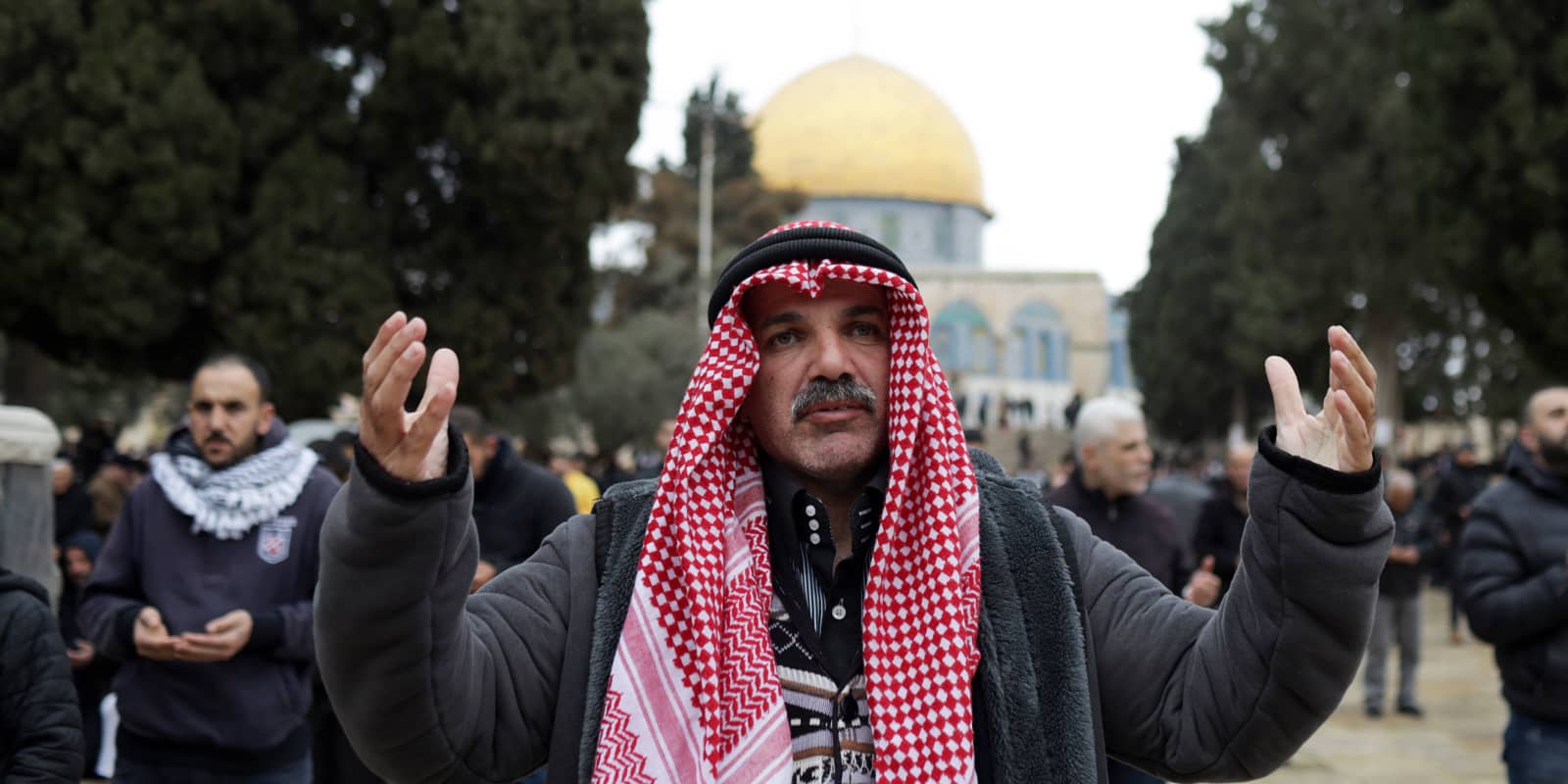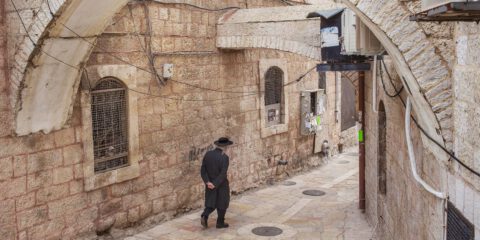אין בסיס לטענות משפטיות כנגד ישראל בנוגע להפרת הסטטוס קוו, או הפרת החוק הישראלי או הבינלאומי בגלל פגיעה בזכויות מוסלמים בהר הבית או במעמדו של האתר. להפך, המדיניות הישראלית הקיימת בעניין הר הבית פוגעת בזכויותיהם המשפטיות של המבקרים הלא-מוסלמים באתר.
הר הבית חוזר לכותרות עם ביקורו של השר לביטחון לאומי איתמר בן-גביר. העולם היה כמרקחה, ואצבעות הופנו כלפי ישראל בהאשמה להפרת הסטטוס קוו, הפרת הדין הבינלאומי ופגיעה במעמדו של האתר. העניין אף הובא לדיון דחוף במועצת הביטחון של האו”ם.
הדיון הסתיים אומנם ללא התפתחויות נוספות שעליהן להדאיג את ישראל, אך עצם קיום הדיון מהווה התפתחות שעל ישראל להתייחס אליה בכובד ראש.
המאמר בוחן את מעמדו המשפטי של הר הבית, בין היתר בבחינת תוכנו ומעמדו של הסטטוס קוו, וכן בבחינת השאלה של הפרת הדין הבינלאומי בהקשר של ביקור יהודים בהר הבית בכלל, וביקורו של השר בפרט.
האם עלייתו של השר לביטחון לאומי הפרה את הסטטוס קוו?
במהלך השנים האחרונות עלו שרים מספר להר הבית, וביניהם גלעד ארדן כשכיהן כשר לביטחון פנים (מקביל היום למשרד לביטחון לאומי) ואורי אריאל כשר החקלאות. על כן, אין ממש בטענה כי עלייתו של השר בן גביר היא שינוי בסטטוס קוו. אזרחי ישראל, ובתוכם אזרחי ישראל היהודים, מורשים לעלות ולבקר באתר. גם שר, שאישיותו נתונה במחלוקת פוליטית, רשאי לעלות להר. הביקור בפני עצמו אינו יכול להיחשב פרובוקציה, משום שביקור כאמור הוא דבר חוקי, מקובל, הקורה מעת לעת.
ביקורם של יהודים באתר הוגבל לפרקים בשל טיעונים ביטחוניים על ידי הרשויות בישראל, אך הזכות המשפטית המהותית הוכרה ללא סייגים על ידי בג”ץ בכמה עתירות שהובאו לפתחו בנושא לאורך השנים (הרחבה בהמשך). עם זאת, יש מגבלות מסוימות על ביקורם של לא-מוסלמים ועל זכותם לקיים פולחנים דתיים באתר. זאת בשל הסטטוס קוו שהתקבע ימים ספורים לאחר איחוד ירושלים ב-1967.
הסטטוס קוו
ימים ספורים לאחר כיבוש ירושלים במלחמת ששת הימים גיבש משה דיין, שר הביטחון דאז, את הסטטוס קוו החדש במקום.
עיקריו של הסטטוס קוו:
- פקידיה של מחלקת ההקדשים (מנהלת הווקף) של ממשלת ירדן ימשיכו בניהול האתר.
- כניסתם של יהודים לאתר תותר באופן חופשי, זאת בניגוד כמובן למצב ששרר תחת השלטון הירדני.
- היהודים יורשו לבקר אך לא להתפלל.
- הריבונות והחוק הישראלי יחולו על האתר.
- ישראל וכוחות השיטור שלה יקבלו את האחריות על הביטחון במתחם, הן על שטחו הפנימי והן על המעטפת החיצונית שלו.
מעמדו המשפטי של הסטטוס קוו
חקיקה
הסטטוס קוו מעולם לא קיבל תוקף משפטי בחקיקה. עם זאת, יש התייחסויות אליו על ידי הרשות המחוקקת, המבצעת והשופטת, אך לא באופן המעגן את מעמדו המשפטי באופן עצמאי.
סטטוס קוו משמעו השארת המצב כפי שהוא. לסטטוס קוו לא קיים ולא יכול להתקיים מעמד משפטי, משום שמקורו וכוחו שאובים ממצב הדברים החברתי/ביטחוני, והדיון בו מתקיים בהכרח במישור הפוליטי בלבד.
הסטטוס קוו מקפיא מצב מסוים כפשרה, מתוך הנחה שהוא יוצר פגיעה מסוימת בצדדים המעורבים, אך לצד הפגיעה מניח שישנו יתרון שאינו נגזר מאופיו של המצב הקיים, אלא מהסכנות הגלומות בשינויו.
אחת השאלות הנשאלות מדי תקופה בקשר לסטטוס קוו בהר הבית, ומובאת לא אחת גם לפתחו של בג”ץ, היא האם הסכנה הגלומה בשינוי הסטטוס קוו מצדיקה את המשך הפגיעה בזכויותיהם של המבקרים הלא-מוסלמים באתר.
פסיקה
עתירות רבות הוגשו לבג”ץ לאורך השנים סביב סוגיית הר הבית, ובעיקרן עסקו בזכות התפילה אשר אסורה על לא-מוסלמים. בעודו דוחה את כל העתירות בנושא, קיבל בג”ץ את הטענה כי האיסורים הקיימים ללא-מוסלמים באתר מהווים הפרה של זכויות יסוד בסיסיות הכוללות את הזכות לשוויון, חופש הפולחן, התנועה והעיסוק. דחיית העתירות (שהוגשו על מנת לאלץ את הרשויות להתיר את התפילה ללא-מוסלמים) נומקו בקבלת סברת הרשויות שיש חשש ממשי לפגיעה משמעותית בביטחון הציבור. בג”ץ לא קיבל חוות דעת של מומחים שלמשטרה ולשב”כ יכולות מוגבלות לנבא את העתיד, ודווקא יכולות גדולות להתמודד עם הפרת הסדר הציבורי. בג”ץ נראה מבקש מהעותרים לבלוע את הגלולה של הפרת זכויותיהם.
צודקים העותרים בטענתם כי ההגבלה על עליית יהודים להר הבית פוגעת בשורה של זכויות יסוד חוקתיות כמו חופש הפולחן, חופש התנועה וחופש העיסוק, לצד פגיעה ברגשות דת ובכמיהה לעלות אל ההר. אך כמו כל הזכויות החוקתיות, זכויות אלה אינן מוחלטות. כך בכלל וכך בעניין הר הבית בפרט (בג”ץ 5403/11 סלומון נ’ ניצב ניסו שחם, פסקה 5 (2.2.2012); עניין פואה, פסקה 10; בג”ץ 8026/16 מוריס נ’ מפקד פיקוד העורף, פסקה 8 (20.10.2016)). מול זכויות אלה יש להעמיד את השמירה על בריאות הציבור וביטחונו. לצורך הדיון אני נכון לקבל את טענת העותרים כי המבחן לפגיעה בהן, כולן או חלקן, הוא מבחן הוודאות הקרובה ועוצמת הפגיעה הצפויה (השוו בג”ץ 4044/93 סלומון נ’ מפקד מחוז ירושלים, משטרת ישראל, פ”ד מט(5) 617, 621 (1996); בג”ץ 2697/04 סלומון נ’ ניצב מיקי לוי, מפקד מחוז ירושלים, פ”ד נח(4) 572, פסקה 3 (2004)).
הסכם השלום בין ישראל וירדן
בהסכם השלום אשר נחתם באוקטובר 1994 נקבע כי:
בהקשר זה, בהתאם להצהרת וושינגטון, ישראל מכבדת את תפקידה המיוחד הקיים של הממלכה ההאשמית של ירדן במקומות קדושים מוסלמיים בירושלים. בשעה שייערך המשא-ומתן על מעמד הקבע, תעניק ישראל עדיפות גבוהה לתפקיד הירדני ההיסטורי במקומות קדושים אלה.
השושלת ההאשמית שלטה בחיג’אז משנת 1201 ועד 1925, והיה לה תפקיד של שמירה על המקומות הקדושים לאסלאם במכה ומדינה במשך דורות רבים. עם כיבוש סעודיה על ידי אבן סעוד ב-1925 איבדה השושלת האשמית את שליטתה באזור ואת מעמדה המיוחד. מעמדה בהקשר של ירושלים והמקומות הקדושים לאסלאם שעל הר הבית נבע מכיבוש ירדן את “הגדה המערבית” ב-1948 ושליטתה בהר הבית עד מלחמת 1967. בעקבות שליטתה בת 19 השנה בהר הבית ירדן תובעת מעמד מיוחד שם אשר מעניק לה גם מעמד בעולם המוסלמי.
בהסכם השלום בין ישראל לירדן ביקשה ממשלת ישראל לכבד עובדה זו, כמו גם את המציאות כפי שבאה לידי ביטוי ב-27 השנים מאז מלחמת ששת הימים. עם זאת, לא ניתן לירדן מעמד משפטי, ולא צוין הסטטוס קוו או התחייבות לשמור עליו.
הבנות קרי
בעקבות המהומות שהתחוללו על הר הבית באוקטובר 2015 פורסמו על ידי מזכיר המדינה האמריקאי דאז, ג’ון קרי, ההסכמות שאליהן הגיע עם ראש ממשלת ישראל ומלך ירדן.
ההסכמות כללו כמה סעיפים עקרוניים, אך החשוב לענייננו הוא ההתחייבות הישראלית להמשך אכיפת מדיניות הפולחן בהר הבית, קרי הזכות המוסלמית להתפלל באתר וזכותם של לא-מוסלמים לבקר בו אך לא להתפלל בו.
ההצהרה הנ”ל מהווה שינוי מסוים במצב הדברים, שכן עד למעמד זה לא ניתנה מעולם הצהרה רשמית המעגנת את ההתחייבות הישראלית לסטטוס קוו. הדבר חשוב משני היבטים, ראשית, ישנה הסכמה של ממשלת ירדן, כמו גם של ארה”ב, בגין הזכות של לא-מוסלמים לבקר באתר. ההיבט השני נוגע להכרה באפליית לא-מוסלמים בקיום פולחנם הדתי באתר.
עם זאת, קשה לראות כיצד בכוחן של הבנות אלה לשנות את המעמד המשפטי של הר הבית או את זכויותיהם של המבקרים בו. כאמור לעיל, גם בג”ץ כאשר דן בעתירות הנוגעות לזכות הביקור והתפילה הכיר בזכויות המבקרים כחלק מזכויות היסוד במדינת ישראל הדמוקרטית, והיה נכון להגביל אותן רק מתוקף עמדתן של הרשויות הנוגעות לסיכונים ביטחוניים.
המשפט הבינלאומי (אמנת ז’נבה הרביעית)
ההאשמות על הפרת המשפט הבינלאומי בהקשר של הר הבית מקורן בטענה השגויה כי מדובר בשטח כבוש התפוס בתפיסה לוחמתית. אך גם אם לצורך הדיון נקבל את הטענה הזו, לא ניתן ליישב את הדינים הרלוונטיים לניהול השטח והאוכלוסייה האזרחית במצב של תפיסה לוחמתית עם דרישות לקיים איסור ואפליה כלפי חלק מהאוכלוסייה, גם אם מדובר באוכלוסיית הרוב של הכוח הכובש.
אמנת ז’נבה קובעת את חובותיו של הכוח הכובש כלפי האוכלוסייה האזרחית ורכושה, זאת בשל החשש לפגיעה וניצול. בין היתר האמנה מתייחסת לזכות לחיים, לחופש תנועה, לקניין, להליך הוגן וכדומה. האמנה אינה מכשירה כמובן פגיעה בזכויותיהם של אזרחיו של הכוח הכובש, אלא דורשת החלת זכויות אדם גם על האוכלוסייה הנכבשת. המשפט הבינלאומי מקדש את השוויון וזכויות האדם ואיננו מכשיר אפליה. על כן, לא תתקבל טענה המכשירה אפליה של מבקרים באתר כלשהו על רקע זהותם הדתית. אפליה בכניסה לאתרי פולחן אינה דבר מקובל, בוודאי לא בעולם הדמוקרטי. למעשה, מלבד החריג של מכה, שאליה לא-מוסלמים אינם מורשים להיכנס כלל, קשה להעלות על הדעת דוגמה שבה מבקר נשאל לדתו טרם כניסתו לאתר דתי כלשהו.
סיכום
בהתאם לאמור לעיל לא קיים בסיס לטענות משפטיות כנגד ישראל בנוגע להפרת הסטטוס קוו, או הפרת החוק הישראלי או הבינלאומי בגלל פגיעה בזכויות פלסטינים או מוסלמים בהר הבית או במעמדם של האתרים הקדושים לאסלאם. למעשה, המדיניות הישראלית הקיימת בעניין הר הבית פוגעת בזכויותיהם המשפטיות של המבקרים הלא-מוסלמים באתר. יש לציין שבנוסף להיותו של הר הבית אתר דתי, הוא גם אתר היסטורי, תיירותי וחינוכי. ההיקף הקטן של ימי ושעות הביקור והמגבלות בחופש התנועה של לא-מוסלמים באתר מהווים למעשה הפרה הן של המשפט הישראלי והן של המשפט הבינלאומי.
החלטותיהן של ממשלות ישראל לדורותיהן בגין הגבלות אלה נובעות משיקולים של יציבות, ביטחון או מעמד בינלאומי והן נעשות למרות הפגיעה המשפטית. על הצדק או התבונה שבמדיניות זו ניתן להתווכח, אך אין כל שחר לטענות משפטיות כנגד ביקורם של יהודים בהר הבית, בין אם מדובר באזרח מהשורה ובין אם בשר בממשלה.
סדרת הפרסומים “ניירות עמדה” מטעם המכון מתפרסמת הודות לנדיבותה של משפחת גרג רוסהנדלר
תמונה : IMAGO / APAimages










 - בניית אתרים
- בניית אתרים